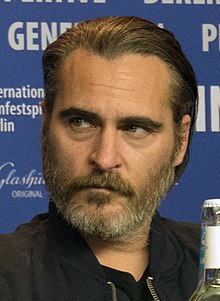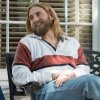- Joined
- Dec 12, 2009
- Messages
- 31,578
- Reaction score
- 9,180
NOTE to NON-MEMBERS: Interested in joining the SHERDOG MOVIE CLUB? Shoot us a PM for more info!
Here's a quick list of all movies watched by the SMC. Or if you prefer, here's a more detailed examination.

Van Sant is an alumnus of Darien High School in Darien, Connecticut, and The Catlin Gabel School in Portland, Oregon. One constant in the director's early years was his interest in visual arts (namely, painting and Super-8 filmmaking); while still in school he began making semi-autobiographical shorts costing between 30 and 50 dollars. Van Sant's artistic leanings took him to the Rhode Island School of Design in 1970, where his introduction to various avant-garde directors inspired him to change his major from painting to cinema.
After spending time in Europe, Van Sant went to Los Angeles in 1976. He secured a job as a production assistant to writer/director Ken Shapiro, with whom he developed a few ideas, none of which came to fruition. In 1981, Van Sant made Alice in Hollywood, a film about a naïve young actress who goes to Hollywood and abandons her ideals. It was never released. During this period, Van Sant began to spend time observing the denizens of the more down-and-out sections of Hollywood Boulevard. He became fascinated by the existence of this marginalized section of L.A.'s population, especially in context with the more ordinary, prosperous world that surrounded them. Van Sant would repeatedly focus his work on those existing on society's fringes, making his feature film directorial debut Mala Noche.
It was made two years after Van Sant went to New York to work in an advertising agency. He saved $20,000 during his tenure there, enabling him to finance the majority of his tale of doomed love between a gay liquor store clerk and a Mexican immigrant. The film, which was taken from Portland street writer Walt Curtis' semi-autobiographical novella, featured some of the director's hallmarks, notably an unfulfilled romanticism, a dry sense of the absurd, and the refusal to treat homosexuality as something deserving of judgment. Unlike many gay filmmakers, Van Sant—who had long been openly gay—declined to use same-sex relationships as fodder for overtly political statements, although such relationships would frequently appear in his films.
* Gus Van Sant directed Joaquin Phoenix's brother River Phoenix in "My Own Private Idaho"(1991).
* This movie was based on a true story about John Callahan, who himself wrote and sung the music track called "Texas when you go", which song can be heard during the end credits of this movie.
* One of the skateboarder kids who help Joaquin Phoenix, when he has an accident with his wheelchair, is a nephew of Joaquin, called Leo Phoenix.
* The actor Udo Kier has also been in Gus Van Sant's film My Own Private Idaho; his character's name was also called Hans.
* Director Gus van Sant has a cameo role as the Willamette week editor.
Here's a quick list of all movies watched by the SMC. Or if you prefer, here's a more detailed examination.

Our Director
Gus Van Zant
(Remember him from Week 80's movie Drugstore Cowboy?)

Gus Van Zant
(Remember him from Week 80's movie Drugstore Cowboy?)

Gus Van Sant was born in Louisville, Kentucky, the son of Betty (née Seay) and Gus Green Van Sant, Sr; Gus's father was a clothing manufacturer and traveling salesman who rapidly worked his way into middle class prosperity, holding executive marketing positions that included being president of the White Stag Manufacturing Company's Apparel Operation. As a result of his father's job, the family moved continually during Van Sant's childhood.
His paternal family is of partial Dutch origin; the name "Van Sant" is derived from the Dutch name "Van Zandt". The earliest Van Zandt arrived in the New Netherland area in the early 17th century, around what is now New York City.
His paternal family is of partial Dutch origin; the name "Van Sant" is derived from the Dutch name "Van Zandt". The earliest Van Zandt arrived in the New Netherland area in the early 17th century, around what is now New York City.
Van Sant is an alumnus of Darien High School in Darien, Connecticut, and The Catlin Gabel School in Portland, Oregon. One constant in the director's early years was his interest in visual arts (namely, painting and Super-8 filmmaking); while still in school he began making semi-autobiographical shorts costing between 30 and 50 dollars. Van Sant's artistic leanings took him to the Rhode Island School of Design in 1970, where his introduction to various avant-garde directors inspired him to change his major from painting to cinema.
After spending time in Europe, Van Sant went to Los Angeles in 1976. He secured a job as a production assistant to writer/director Ken Shapiro, with whom he developed a few ideas, none of which came to fruition. In 1981, Van Sant made Alice in Hollywood, a film about a naïve young actress who goes to Hollywood and abandons her ideals. It was never released. During this period, Van Sant began to spend time observing the denizens of the more down-and-out sections of Hollywood Boulevard. He became fascinated by the existence of this marginalized section of L.A.'s population, especially in context with the more ordinary, prosperous world that surrounded them. Van Sant would repeatedly focus his work on those existing on society's fringes, making his feature film directorial debut Mala Noche.
It was made two years after Van Sant went to New York to work in an advertising agency. He saved $20,000 during his tenure there, enabling him to finance the majority of his tale of doomed love between a gay liquor store clerk and a Mexican immigrant. The film, which was taken from Portland street writer Walt Curtis' semi-autobiographical novella, featured some of the director's hallmarks, notably an unfulfilled romanticism, a dry sense of the absurd, and the refusal to treat homosexuality as something deserving of judgment. Unlike many gay filmmakers, Van Sant—who had long been openly gay—declined to use same-sex relationships as fodder for overtly political statements, although such relationships would frequently appear in his films.
Our Star
Joaquin Phoenix

Joaquin Phoenix

Film Overview
Premise: On the rocky path to sobriety after a life-changing accident, John Callahan discovers the healing power of art, willing his injured hands into drawing hilarious, often controversial cartoons, which bring him a new lease on life.
Budget: $7.5 million
Box Office: $3.9 million
Premise: On the rocky path to sobriety after a life-changing accident, John Callahan discovers the healing power of art, willing his injured hands into drawing hilarious, often controversial cartoons, which bring him a new lease on life.
Budget: $7.5 million
Box Office: $3.9 million
Trivia
(Courtesy of IMDB)
* Director Gus Van Sant originally planned to make this movie in the 1990s, with Robin Williams starring as John Callahan.(Courtesy of IMDB)
* Gus Van Sant directed Joaquin Phoenix's brother River Phoenix in "My Own Private Idaho"(1991).
* This movie was based on a true story about John Callahan, who himself wrote and sung the music track called "Texas when you go", which song can be heard during the end credits of this movie.
* One of the skateboarder kids who help Joaquin Phoenix, when he has an accident with his wheelchair, is a nephew of Joaquin, called Leo Phoenix.
* The actor Udo Kier has also been in Gus Van Sant's film My Own Private Idaho; his character's name was also called Hans.
* Director Gus van Sant has a cameo role as the Willamette week editor.
Members: @europe1 @MusterX @Kyojiro @Cubo de Sangre @FrontNakedChoke @Mr Mojo Lane @Minotauro Rex Foot @Tufts @chickenluver @RightEyeRick @Scott Parker 27 @Coolthulu @OMGstreetfight @Yotsuya @jei @LHWBelt @moreorless87 @HARRISON_3 @Bullitt68 @HenryFlower @Zer @TheLinguist @Rimbaud82





